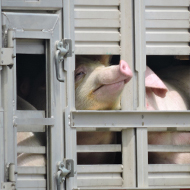Vets warn over further delays to EU import checks

"We feel it would be deeply misguided to push back the need for these vital checks even further"- James Russell.
British Veterinary Association (BVA) senior vice president James Russell has warned that further delays to EU import checks could “wreak havoc for disease prevention”.
On Wednesday (30 March), the Financial Times reported that senior government officials are “sympathetic” to the idea of further delays beyond July for the new checks.
The BVA is concerned that a further delay could have serious consequences for the UK’s biosecurity and increase the threat of devastating diseases, such as African Swine Fever.
Mr Russell, who recently gave evidence on border readiness to the Environment, Food and Rural Affairs (EFRA) Committee, said: “If this extension is allowed to go ahead it will be the fourth delay and open the door even further to the potential incursion of African Swine Fever, which is spreading rapidly and has already had a catastrophic impact on animal health and agricultural industry in parts of Europe, Asia and Africa.
“Official Veterinarians working at the border act as the country’s first line of defence of biosecurity, and we feel it would be deeply misguided to push back the need for these vital checks even further and in so doing weaken this layer of protection for both animal and public health.”
During his presentation to the EFRA committee, Mr Russell highlighted the critical role of Official Veterinarians in carrying out checks on live animals and animal products coming into Great Britain. BVA says this work has become particularly vital now that the UK operates outside of the EU’s biosecurity and assurance systems.
Mr Russell continued: “We’ve also made the point that the veterinary profession needs certainty and clear dates to work towards instead of yet more shifting timeframes. Given the ongoing capacity challenges in the workforce, it’s really important that we can prepare and allocate resource where it’s most needed.”



 The Federation of Independent Veterinary Practices (FIVP) has announced a third season of its podcast, Practice Matters.
The Federation of Independent Veterinary Practices (FIVP) has announced a third season of its podcast, Practice Matters.